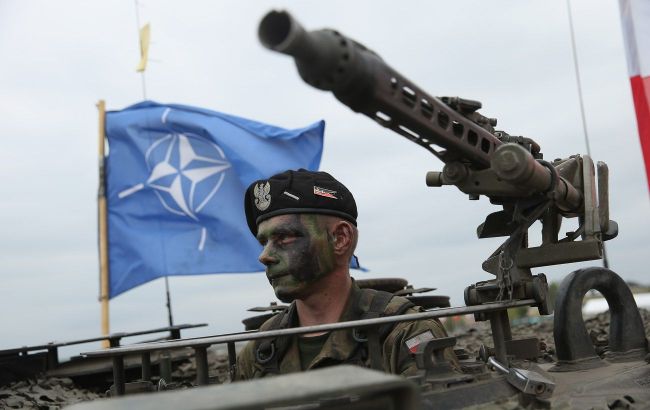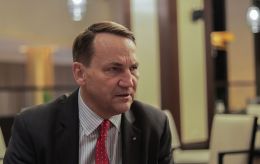Expert says whether NATO can strike Russia preemptively and under what conditions
 NATO does not rule out the possibility of preemptive strikes on Russia (Illustrative photo: Getty Images)
NATO does not rule out the possibility of preemptive strikes on Russia (Illustrative photo: Getty Images)
Statements from top NATO commanders about the possibility of launching preventive strikes against Russia suggest a potential shift in the alliance's defense strategy. And, under certain conditions, the bloc may indeed consider such a move, states Serhii Dzherdzh, Head of the Public League Ukraine-NATO, in a comment to the RBC-Ukraine YouTube channel.
Earlier, Rob Bauer, Chairman of the NATO Military Committee, suggested the possibility of strikes on Russian territory in the event of an impending attack.
According to Dzherzh, these remarks are a response to Russia's shifting nuclear doctrine, which allegedly claims the right to use nuclear weapons against non-nuclear countries if they employ conventional NATO weapons (from countries with nuclear arsenals).
"It seems to me that Bauer was signaling that NATO has its response. If Russia plans an attack, and this can be detected in advance through satellite intelligence and other means, NATO could act preemptively," he noted.
According to the expert, this is an evolution of NATO's deterrence strategy. Initially, the tactic was to avoid provoking Moscow and not to strengthen the eastern flank too much. In such a case, if Russia had attacked, they would have likely captured the Baltic states and half of Poland, while NATO forces would have gathered further west, only then pushing back the enemy after receiving support from the US.
After Russia invaded Ukraine, the strategy shifted, partly under pressure from the Baltic states, who did not want to be under occupation for a single day. Consequently, NATO is now reinforcing its presence on the eastern flank to signal to Russia that they should not even attempt to cross the border.
"The statement made by Bauer is a new concept for NATO," the expert said. "It suggests that if Russia starts gathering troops and deploying missiles, and NATO is convinced that the day of war is near, it will preemptively strike enemy targets. I don't think his words were said just like that. They are official statements. A quiet, modest, but serious signal to Russia."
The expert also emphasized that, while NATO leaders typically make political statements in public, the alliance has a very powerful military tool at its disposal. The task of the command is to prepare for various challenges and have 200 options for each scenario.
"On one hand, there's a call for the US to deploy intermediate-range ballistic missiles in response to Russian threats. On the other hand, NATO has other forces and means that it can have on standby and, if necessary, use military force against Russia," added Dzerzh.
What did top NATO general Rob Bauer say
In a discussion at the European Policy Centre, Rob Bauer, Chairman of the NATO Military Committee, stated that NATO countries need to invest more in air defense and long-range capabilities in response to the threat posed by Russia.
"The idea is that we are a defensive alliance, so we will only sit and wait until we are attacked. And when we are attacked, we will be able to shoot down the arrows (missiles - ed.) that come to us. But it's smarter not only to do that but also to attack the archer that is in Russia if Russia attacks us," he explained.
Earlier, Mark Rutte, NATO Secretary General, stated that member countries of the alliance must change the trajectory of Russia's war against Ukraine.
The first steps toward this goal should include critically important air defense systems and the fulfillment of all commitments made to Ukraine at the previous summit in Washington. This includes the preparation of military personnel, financial and military assistance amounting to 40 billion euros, as well as measures to further integrate the country with NATO.



